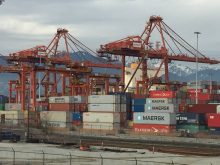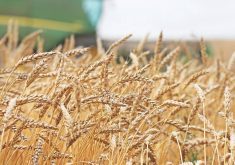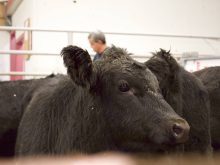Western Canada’s ranchers and feedlots are holding slaughter-ready cattle back from market longer than usual, absorbing extra costs as they try to wait out the closure of one of the region’s biggest processing plants due to a massive recall of potentially tainted beef.
But as the closure of XL Foods’ Lakeside beef plant at Brooks, Alta. nears the two-week point, the industry will soon have to consider sharply increasing exports of slaughter-ready cattle to U.S. packing plants, said Brian Perillat, senior analyst at CanFax.
"On the fed cattle side, things are going to get tougher before they get better," he said. "It has been muted in the short term (as) we’ve been able to hang on and limit the number of marketings to keep the price up. But at some point we’re going to get squeezed."
Read Also

Canada December retail sales down 0.4 per cent; seen up 1.5 per cent in January
Canadian retail sales decreased by 0.4 per cent in December to $70 billion on a monthly basis, led by a drop in sales at motor vehicle and parts dealers, Statistics Canada said on Friday.
Holding back cattle from the market comes at a cost of about $4 per head per day, said Bryan Walton, CEO of the Alberta Cattle Feeders Association.
Recalls of steaks, ground beef and other meats from XL Foods, totaling more than 1,800 products, began in mid-September following findings of O157, a toxic strain of E. coli bacteria, in some products. The Canadian Food Inspection Agency (CFIA) closed the plant on Sept. 27.
Western Canadian fed cattle exports to the U.S. are approaching 10,000 head per week, nearly double the number in early September but similar to a year ago. If the plant remains closed more than another week, cattle will need to move in droves of about 20,000 head weekly to the U.S., Perillat said.
The exported Canadian cattle are mainly headed to three U.S. plants: Tyson facilities at Pasco, Washington, and Lexington, Nebraska, and a JBS USA Holdings Inc plant at Hyrum, Utah.
A CFIA spokesman said Wednesday that inspectors have reviewed the XL Foods plant and submitted a report to senior officials. The plant’s operating license remains suspended.
According to the Public Health Agency of Canada on Wednesday, 12 people in four provinces — seven in Alberta, three in Quebec and one each in British Columbia and Newfoundland and Labrador — have had illnesses linked to products containing beef from Lakeside.
XL Foods slaughters nearly 40 per cent of all Canadian cattle, or 4,500 head per day, amounting to an estimated 36,000 head assuming that XL has missed eight production days so far. Cargill, which runs a similar-sized plant at High River, Alta., has absorbed some cattle by boosting production.
"Pure opportunity"
The influx of Canadian cattle is "pure opportunity" for the U.S. cattle packing industry, which is operating with fewer animals and excess slaughter capacity as the nation’s cattle herd dwindles, said Dennis Smith, a broker with Archer Financial Services in Chicago.
"These guys can kill a lot more cattle than we have available so the extra cattle, and likelihood of Japan relaxing its age restriction on U.S. cattle at some point next year, are two real good pieces of good news for U.S. beef packers," Smith said.
Prices of most categories of cattle in Western Canada have fallen below year-ago levels, both because of the XL plant closure and a stronger Canadian dollar. But the price drop has been muted so far by a steady pickup in exports to the U.S., and feedlots keeping cattle longer, Perillat said.
In Western Canada, a fed steer sold for about $106 per hundredweight (cwt) as of last week, versus the year-ago price of $110. The break-even point for a feedlot is over $120/cwt, he said.
Prices have dropped about $200 per head in the last month, to $900, as XL is the main Canadian cattle-killing plant.
"This is the time of year we’re bringing all of our cattle in, and sorting them and selling them," said Doug Sawyer, a cow-calf producer at Pine Lake, Alta. "Couldn’t have picked a worse time for us than right now."
In the U.S., no impact of more Canadian supplies has been noticeable on prices. Some U.S. ranchers downsized their herds due to the worst drought in more than half a century, which baked fields and pastures, sending feed costs to record highs and doubling prices for hay.
The XL meat recall is the biggest in Canada since at least 2008, when 22 people died after eating tainted deli meat linked to a Toronto processing plant.
E. coli O157, which can cause sickness or even death, is widely present in meat-processing plants and regulators require packers to control the bacteria within certain levels. E. coli can be killed by thoroughly cooking meat.
— Rod Nickel and Theopolis Waters write for Reuters from Winnipeg and Chicago respectively.

















